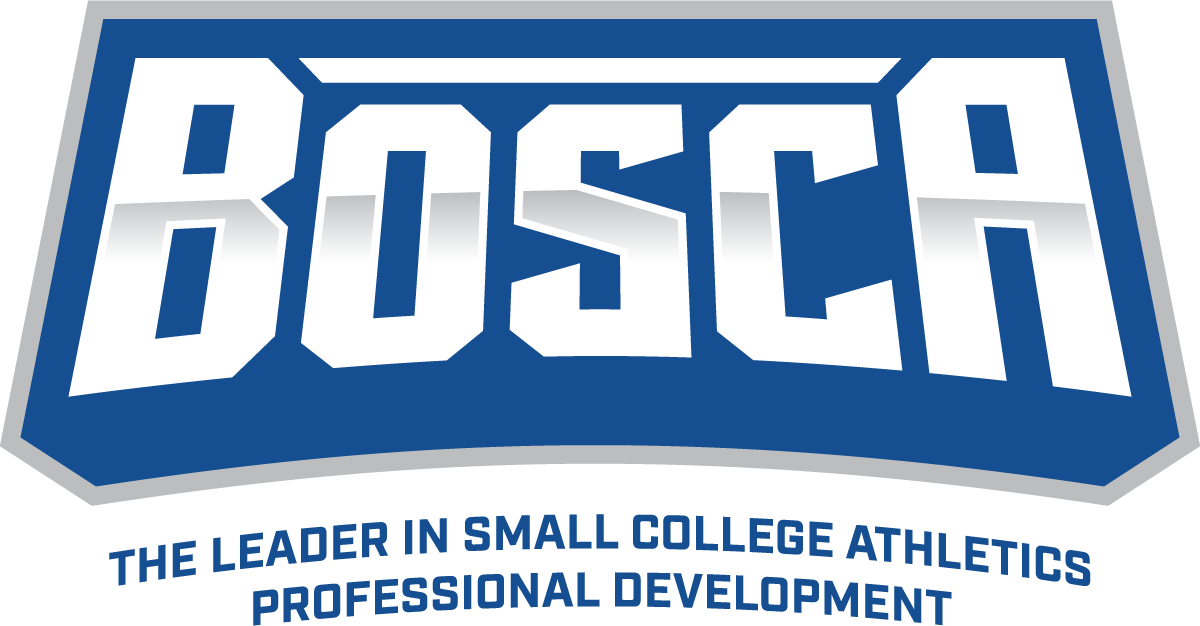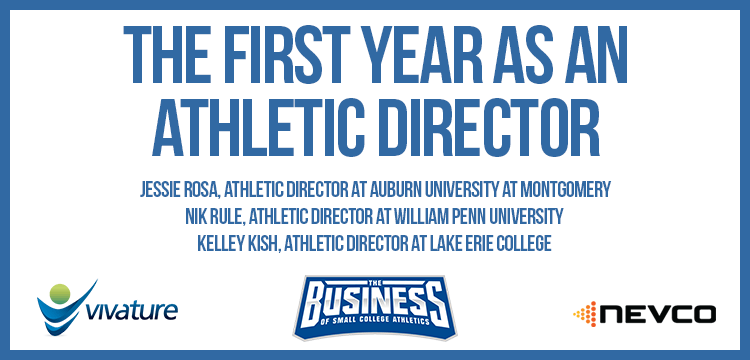First Year as an Athletic Director
Insights into being a new AD
This week’s Small College Athletics blog focuses on “The First Year as an Athletic Director.” Special thanks to Jessie Rosa , Athletic Director at Auburn University at Montgomery, Nik Rule , Athletic Director at William Penn University, and Kelley Kish, Athletic Director at Lake Erie College for reflecting on their first year in the AD’s chair and for sharing their insights.
What were your priorities in your first 100 days as
Athletic Director?
NR:
The first 100
days were a really crucial time in the first year that I had the opportunity to
lead our athletic department. I met with all our coaches and asked them what
they liked about what we were doing, while also asking them what opportunities
they saw for our department to improve in our effort to strive to be a leader
in small college athletics. I learned a lot about what to focus on for our team
and what opportunities we had going forward.
JR: First thing I did was tweak the structure/organization of the department. I knew what my skill set was and what the skill sets of my team members were. I sat down and looked at areas where I knew we wanted to grow. The main one was fundraising. I reorganized in a way that let me elevate one of our staff members into an Assistant AD role, that would allow his primary responsibility to be fundraising. Transitioning to NCAA D2 is a huge selling point right now. People are excited about AUM Athletics and we needed to capitalize on that excitement. We never had a specific point of contact for fundraising. In the past, it had been primarily the AD and then every sport/person had their own individual goals. Each sport still has goals, but now they have a point person that they can go to, which has really impacted our revenue generation. Also, we had been in a state of pause with a facility enhancement campaign. I knew that with the transition process, we had to get that going again. We’ve been able to secure major gifts towards that project. I don’t think we would have gotten there with our previous structure. Outside of that change, I took time to share my short-term and long-term vision with the department. I gave us goals for the year and years beyond. I sat down with each coach and discussed expectations after revamping their performance plans. Define, define, define. Don’t just talk about things generally --- make sure your plans and expectations are clear. It takes time to have all of those conversations, but it is well worth it because then you have structure and a system for accountability in place.
KK: Since I started at the end of the Fall semester, I used the first 100 days to learn about our staff, department and overall campus culture. Jumping right in with Winter Sports in full swing gave me opportunities to engage with our student-athletes and staff. I also made my availability a priority, this allowed for time to listen, ask questions and observe. The focus within the first 100 days allowed me to enter my first full academic year with knowledge and insight from all key stakeholders on our direction going forward.
Is the AD job what you expected it would be? What
surprises did you encounter?
JR:
Yes and no. I love it.
I knew that I would. I had a
trial run as interim so it’s difficult to really pinpoint any surprises. Generally speaking, I don’t think you can
ever really be ready for every piece of it.
There are always unknowns until you sit in that chair. I was extremely close to the AD I worked for,
for 10 years. He knew I had aspirations
of becoming an AD and I felt as though he kept me aware of a lot of things in
trying to help me prepare. With that
being said, I had NO idea about some of the things he dealt with on a daily
basis, or just the weight of the position.
As Assistant AD/ Associate AD, you think you know what it would be like,
but you really don’t. Things that were
suggestions as the #2 are now decisions and those decisions are mine. My decisions directly affect 20+ full-time
employees, 175+ student-athletes. You
don’t understand the magnitude of that when it’s a suggestion.
KK: It is what I expected it to be, thanks to learning from mentors and former bosses. At the same time, there are surprises. As prepared as I feel, learning a new institution while setting the tone for my leadership and evaluating everything requires time. The biggest surprise, that you hope for, but I got to see happen is how our student-athletes and coaches responded to success. We are coming off of our most successful year ever – with every single women’s program making the conference post-season, two men’s programs making the conference semifinals, a conference division championship, a conference regular season championship, a conference tournament championship and individuals at Nationals. All of this just continues to drive each program and each student-athlete to continue to make history for our institution. It’s the reaction you hope for, but it is a surprise just how that impacts our culture and the day to day drive of our department and campus.
NR: Our last athletic director and I worked together on so many different projects and he knew my interest in athletic administration. He really took me under his wing and let me in on a lot of the inner workings, I am grateful for his investment in me as a coach and aspiring athletic director at the time, as it was vital in my preparation. The biggest surprise I had, was how willing athletic directors in the industry are to share information, ideas and insight with one another. There are so many avenues to learn and grow with forums like the #scachat, BOSCA or NACDA. After being a coach for eight years, it was eye-opening because the coaching profession isn’t as transparent. I have made great connections and friendships already, especially in our conference with fellow AD’s.
What in your past experience best prepared you for the
A.D. position?
KK: The opportunity to work at UIndy under Dr. Sue Willey showed me how you win in sport, win in graduating student-athletes and win in community engagement. She also showed me how service to our division, to our conference, to our campus allows you to be the best administrator possible for your program. Learning alongside her and the continued mentorship from her sets the tone for my leadership style and always learning, always preparing to be the best for our student-athletes that I can each day.
JR: Being the #2 definitely helped. Not every AD prepares their #2 like my AD did. I know that and am extremely thankful for it. The array of experiences I worked in as I moved up the ladder also helped me. I’ve got at least a little taste of everything – coaching, sports information, internal ops, game day ops. I think all of that has prepared me to be an AD at the small college level. You don’t stop wearing multiple hats once you’re AD. I think the fact that I held different positions was instrumental in my preparation.
NR: About seven years ago, I received some great advice from a mentor. He told me to identify where you are now and figure out where you want to be, then map a plan out on how to get there. I immediately realized that I had already started procuring the experience in coaching, but I also needed development and board experience, while also advancing my education. I took on a role in our Development office and served on the local school board. In the meantime, I also earned a Masters in Sports Management from Liberty University and a Master’s in Business Leadership from William Penn University. In the end it was the multitude of experience that I feel best prepared me for the role.
How do you manage your time differently as the
A.D.? How much time do you spend in meetings, fundraising, etc?
NR:
One of the
most difficult things I have found in this role is being intentional about
making time to focus on the big picture. I plan out each day making sure I
accomplish my big three that help advance our department, beyond the day to day
tasks. This role requires someone who is going to work to be a visionary,
looking for ways to help the department get one percent better each day.
JR: I’m an extremely organized person. My dad was military so there was always a plan, and mom my always had a pocket calendar with what kid, went to what activity, on what day, at what time. I had no choice but to be organized. I think it’s a huge reason why I am able to maximize my time, and a key piece in why I’ve been able to walk the professional path that I have. People underestimate how much organization can maximize everything you do. Even though I consider it a strength, I could always use more hours in a day. I haven’t really thought about managing my time differently. However, my time is definitely spent differently. I absolutely love meetings, said no one ever. But they’re important (most of them, anyway). A little trick I’ve taught myself about meetings. Rather than thinking “I have to go to a meeting” I try to tell myself “I get to go to a meeting.” I get to be the Athletics Director. I get to sit on committees that are critical to the institution, not just the Athletics Department. I get to have a seat at the table when important dialogue is happening. I get to serve in a role where my opinion and input is wanted. Sure, when I go to some of the meetings, I joke with the staff as I’m leaving our office suite “Well, I get to go do this…”, but really when you think about the core of what you’re doing, it makes you appreciate when you say “get to” vs. “have to.” Fundraising happens daily. We’re are in the early stages of a Facility Enhancement Campaign for 3 of our sport facilities. It ranges from a simple call to a Booster to check-in, to a discussion of a trade-out opportunity if I’m at a restaurant getting lunch, to a solicitation of a major donation. Either way, I touch fundraising somehow-someway, every single day.
KK: Personnel has occupied a lot of my time to this point. We are on our 4th head coach hire since I arrived. It has been tremendous for our campus, department and student-athletes to be involved in those searches. I also really got to dive in to those programs and what they needed very early after arriving. While personnel has been a big time draw, it helps with setting the culture and bringing in staff who align with our vision for the department. The other time is spent in meetings and working on advancing our department and providing the best student-athlete experience possible for our 17 sports.
What has been your favorite memory from your first year
as an Athletic Director?
NR:
The first
year was an incredible experience. I would say that my favorite memory isn’t
just one, but each time after a big win that our coaches and I embraced with
pure excitement and joy. Seeing them be satisfied after success with our
student-athletes is a special feeling.
KK: Definitely hosting and winning the Women’s Lacrosse GMAC Tournament after winning the regular season. It was a nice cap to my first full semester to hold our Championship Trophy. Plus going to my first Nationals as an AD with Wrestling in Iowa! Watching our student-athletes achieve their goals and celebrate their hard work and dedication is always a highlight.
JR: My former boss moved out of the country when he retired so communication has been through email and less than it would be if he was still in the states. He wrote me a lengthy note not too long ago about how proud he was of me, just after my first full academic year concluded. I just want to make people proud --- my family, our student-athletes, our Chancellor, my colleagues. And that doesn’t necessarily mean proud of me --- proud of AUM, proud to wear our jersey, proud to work with our department. Knowing that he was proud of who I am today, meant a lot. I’ll keep that note forever.
What would you tell other new AD’s that would help them
navigate their first year in the position?
JR: Trust your people. I am fortunate in this. I didn’t have to go searching for my people. They were right here when I was named AD. If you’re new to a university or need to make personnel changes, do it but then let them do their job. I would hope that our administrative staff would say that I don’t micromanage. Sure, there are times when I need to address situations, but for the most part, I define their expectations and let them do their job. It wasn’t like that the first few months, but then I realized that I needed to be a little less in the weeds and more visionary. You can’t do that if you don’t have the right people in place, that you’re able to trust. From our GA’s to our Administrative Associate, SID Office and Assistant AD’s --- everyone does their part. That makes my job a ton easier.
NR: There are people who want to invest in you. They may be mentors, managers, community members, or others with expertise. I believe that sometimes people are afraid to inconvenience those that they can learn from and that could be a huge missed opportunity. Take time to utilize the people around you who want to invest you, get feedback and don’t be afraid to ask questions.
KK: Be prepared to have an ongoing list where things are constantly added. As the #2 at NSU and UIndy, I made progress on that list more rapidly. Some of that is due to transition and approaching my first Fall at Lake Erie, but making things a priority outside of the list plays a role too. And be prepared to have a lot of fun. Day by day, talking to student-athletes and staff, it is a great feeling to learn what drives them and how we will continue to make history and reach our goals for them around graduation, their sport and being part of the greater campus and Cleveland community.




